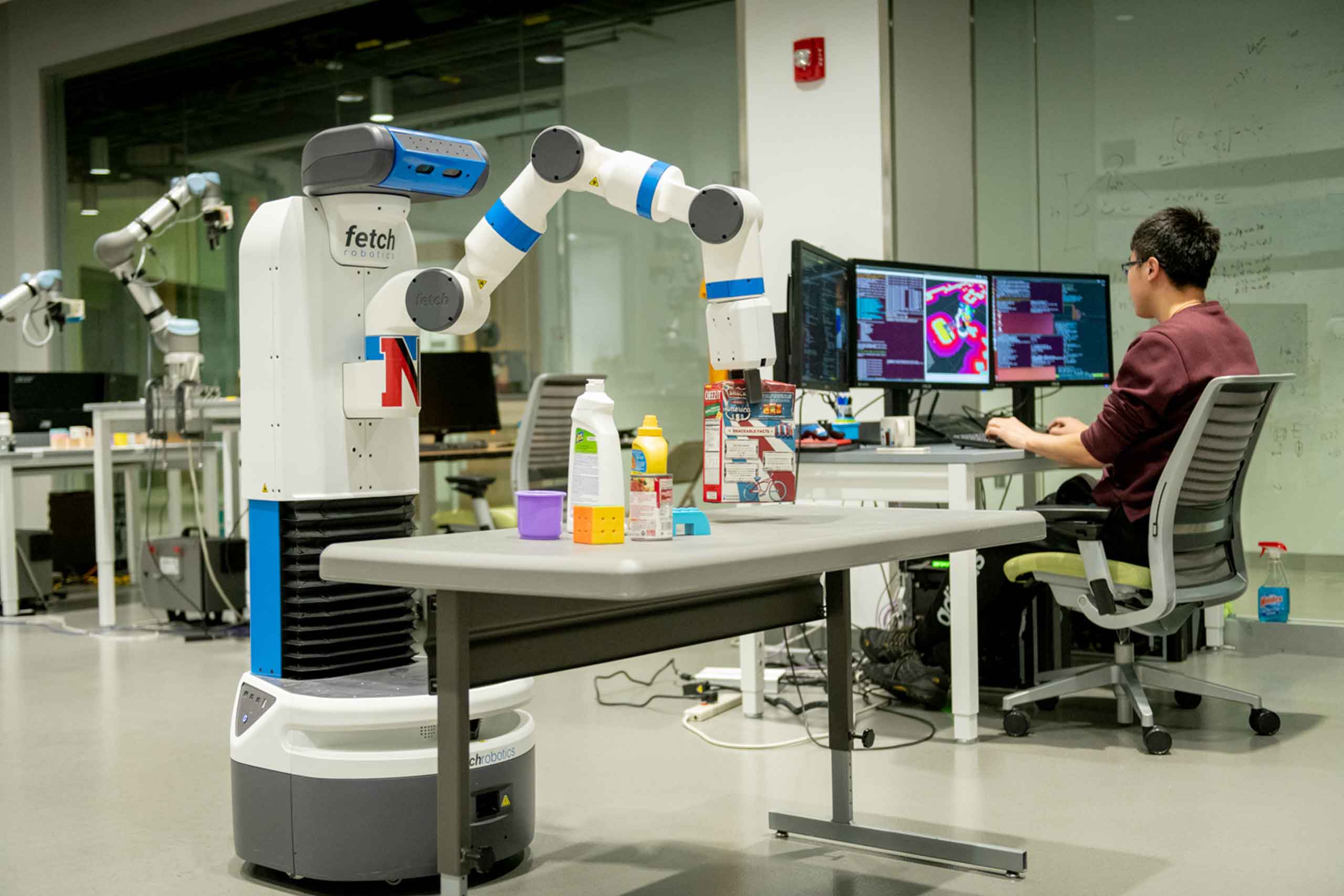





The PhD in Personal Health Informatics (PHI) is a joint program between the Khoury College of Computer Sciences and Bouvé College of Health Sciences. It combines interdisciplinary curriculum with rigorous research opportunities, including collaborations with industry partners, medical institutions, community organizations, and other partners throughout Boston’s robust health, technology, and personal health sectors.
The program focuses on innovations that improve care from the patient’s perspective, setting us apart from medical and health informatics degrees that focus primarily on the impact of provider-facing systems. These personal health technologies are used by non-health professionals both in and out of clinical settings and in various life stages of illness and wellness. We are committed to educating future leaders who will transform health care and empower individuals to lead healthy, engaged, and high-quality lives.
The PhD in Personal Health Informatics (PHI) is a joint program between the Khoury College of Computer Sciences and Bouvé College of Health Sciences. It combines interdisciplinary curriculum with rigorous research opportunities, including collaborations with industry partners, medical institutions, community organizations, and other partners throughout Boston’s robust health, technology, and personal health sectors.
The program focuses on innovations that improve care from the patient’s perspective, setting us apart from medical and health informatics degrees that focus primarily on the impact of provider-facing systems. These personal health technologies are used by non-health professionals both in and out of clinical settings and in various life stages of illness and wellness. We are committed to educating future leaders who will transform health care and empower individuals to lead healthy, engaged, and high-quality lives.
The PhD in Personal Health Informatics (PHI) is a joint program between the Khoury College of Computer Sciences and Bouvé College of Health Sciences. It combines interdisciplinary curriculum with rigorous research opportunities, including collaborations with industry partners, medical institutions, community organizations, and other partners throughout Boston’s robust health, technology, and personal health sectors.
The program focuses on innovations that improve care from the patient’s perspective, setting us apart from medical and health informatics degrees that focus primarily on the impact of provider-facing systems. These personal health technologies are used by non-health professionals both in and out of clinical settings and in various life stages of illness and wellness. We are committed to educating future leaders who will transform health care and empower individuals to lead healthy, engaged, and high-quality lives.
The PhD in Personal Health Informatics (PHI) is a joint program between the Khoury College of Computer Sciences and Bouvé College of Health Sciences. It combines interdisciplinary curriculum with rigorous research opportunities, including collaborations with industry partners, medical institutions, community organizations, and other partners throughout Boston’s robust health, technology, and personal health sectors.
The program focuses on innovations that improve care from the patient’s perspective, setting us apart from medical and health informatics degrees that focus primarily on the impact of provider-facing systems. These personal health technologies are used by non-health professionals both in and out of clinical settings and in various life stages of illness and wellness. We are committed to educating future leaders who will transform health care and empower individuals to lead healthy, engaged, and high-quality lives.

PhD students at Khoury College gain deep knowledge and invaluable experience—preparing them for a career in academia as well as research.

PhD students at Khoury College gain deep knowledge and invaluable experience—preparing them for a career in academia as well as research.

PhD students at Khoury College gain deep knowledge and invaluable experience—preparing them for a career in academia as well as research.

PhD students at Khoury College gain deep knowledge and invaluable experience—preparing them for a career in academia as well as research.
This program seeks to produce graduates who are capable of leading and performing independent, new research projects related to personal health informatics and who are well prepared to enter into a number of potential career paths, including industrial research positions, government consultants, or postdoctoral or junior faculty positions in academic institutions in either technology programs or schools of health science, public health, or medicine.
The dissertation committee evaluates whether the student has produced a significant contribution to personal health informatics research. The process used by the dissertation committee is based on an assessment of the goals and objectives described in the written PhD proposal. Student success can also be measured in the number and quality of publications generated by the research.
Publication venues will provide a means to assess the quality of the program, as well as the research projects. External research funding and incoming student quality will be used to measure program strength. In addition, graduates will be asked for feedback concerning their training and program preparation.
This program seeks to produce graduates who are capable of leading and performing independent, new research projects related to personal health informatics and who are well prepared to enter into a number of potential career paths, including industrial research positions, government consultants, or postdoctoral or junior faculty positions in academic institutions in either technology programs or schools of health science, public health, or medicine.
The dissertation committee evaluates whether the student has produced a significant contribution to personal health informatics research. The process used by the dissertation committee is based on an assessment of the goals and objectives described in the written PhD proposal. Student success can also be measured in the number and quality of publications generated by the research.
Publication venues will provide a means to assess the quality of the program, as well as the research projects. External research funding and incoming student quality will be used to measure program strength. In addition, graduates will be asked for feedback concerning their training and program preparation.
This program seeks to produce graduates who are capable of leading and performing independent, new research projects related to personal health informatics and who are well prepared to enter into a number of potential career paths, including industrial research positions, government consultants, or postdoctoral or junior faculty positions in academic institutions in either technology programs or schools of health science, public health, or medicine.
The dissertation committee evaluates whether the student has produced a significant contribution to personal health informatics research. The process used by the dissertation committee is based on an assessment of the goals and objectives described in the written PhD proposal. Student success can also be measured in the number and quality of publications generated by the research.
Publication venues will provide a means to assess the quality of the program, as well as the research projects. External research funding and incoming student quality will be used to measure program strength. In addition, graduates will be asked for feedback concerning their training and program preparation.
This program seeks to produce graduates who are capable of leading and performing independent, new research projects related to personal health informatics and who are well prepared to enter into a number of potential career paths, including industrial research positions, government consultants, or postdoctoral or junior faculty positions in academic institutions in either technology programs or schools of health science, public health, or medicine.
The dissertation committee evaluates whether the student has produced a significant contribution to personal health informatics research. The process used by the dissertation committee is based on an assessment of the goals and objectives described in the written PhD proposal. Student success can also be measured in the number and quality of publications generated by the research.
Publication venues will provide a means to assess the quality of the program, as well as the research projects. External research funding and incoming student quality will be used to measure program strength. In addition, graduates will be asked for feedback concerning their training and program preparation.















